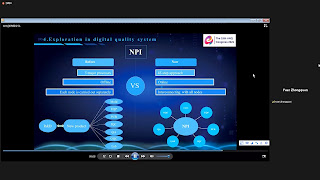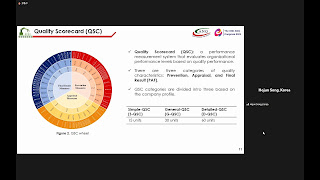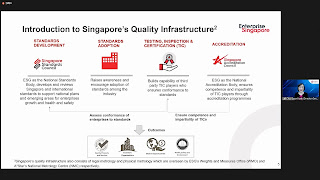Asian Network for Quality (ANQ) Congress 2021
was held by Singapore Quality Institute (SQI) online via Zoom in Singapore from
20th to 21st Oct 2021.
The theme is “Relentless Pursuit of Quality in VUCA World” (where VUCA
stands for Volatile, Uncertain, Complex and Ambiguous).
Parallel Session 13 - 24
I attended the session SP-14 (AI, IoT,
Environmental Management) and Fan Qing, China Association for Quality (CAQ) is
chair in this session.
The first speaker was Ms. Tinglan Hu and her
topic entitled “Application of AI Vision Technology in Home Appliances”. Firstly, she mentioned status quo of AI
vision technology including quality monitor, manual visual inspection,
traditional machine vision inspection and AI detection methods. Then the visual
inspection system included hardware and software was introduced.
Finally, Ms. Hu discussed different case
analysis and summarized that AI technology in household application as the
starting point, the big data behavior mode, product intelligence, user
interaction experience as the theoretical basis and designed the actual concept
product to expect to inspire the workers engaged in this industry.
Mr. Lu Fating was the second speaker and his
presentation was “Practical Experience Base on Intelligent Quality System”. In
the beginning, he mentioned new opportunities that times are changing from
quality of the product to quality of service and then to Internet Experience.
After that he
shared different new practices as follows:
-
Human-Human Training VR Virtual Model Training
-
Human-Computer Interaction Information to People
-
Equipment digitization after the event to change in advance
-
Big Data Acquisition of Inner Cylinder
-
Using RFID Technology to Realize the Whole Process of
Material Traceability
-
Intelligent Zero Omission of the First Sealed Sample
- Real-time monitoring of intelligent eye SOP
process execution, etc.
Ms. Yuan Zhongquan was the third speaker and her
topic named “Application and Implementation of Digital Quality System”. Firstly, she mentioned the background of
digital transformation and the introduced digital quality system analysis and
characteristics.
Lastly, Ms. Yuan briefed the exploration in
digital quality system such as before and after of new product introduction.
She concluded phase achievements from improving process capability to standard
improvement to improvement of user satisfaction to continuous innovation and
then to be world-class ecological brand.
Mr. Milind Deshpande (Mahindra Institute of
Quality, India) was the fourth speaker and his topic was “Industrial Internet
of Things (IIoT) for QI”. Mr. Deshpande
introduced IIoT and connected factory, digitization of SCM and equipment management.
After that he pointed out several challenges in
the IoT projects. Then he proposed capability building through digital
experience center (DEC) with AI, VR, AR, ML, Digital Twins and i4.0, etc.
Mr. Parshuram Mishra (Tata Power, India) was the
fifth speaker and his presentation named “Reliability & Maintainability: - Transformation
Operation & Maintenance and achieving through Reliability Centered
Maintenance (RCM). Firstly he briefed
the collaborative effort of people across sites and then briefed the four
pillars of RCM implementation.
At the end, he compared the achievement between
typical maintenance and Reliability Centered Maintenance (RCM), as well as
explained their impacts.
The last speaker in this session was Mr. Binod
Kumar Satpathy (Bharat Heavy Electricals Ltd., India) and his topic named “A
Quality Maturity Measurement Model (QMMM) to Evaluate and Enhance Effectiveness
of Quality Management Systems”. In the
beginning, Mr. Satpathy explained Quality360 as QMMM that is based on Deming’s
PDCA cycle. There is a need to introduce a mechanism which will bridge the gap
between basic ISO 9001 compliant company and world-class company.
And then Mr. Satpahty explained the Quality360 model
with criteria and score for different type of industry. The total mark is 1000
and ISO 9001 system requirement only 100 or 150 marks. Lastly he briefed the
benefits after implemented QMMM.
Then I attended the session SP-23 (Quality Management)
and Dr. Roy Rimington (SQI) is chair in this session.
Mr. Igor Pundel and Ms. Larisa Fedyk (Russia) were
the last speaker in this session and their topic entitled “Health Management -
Training Programme for personalized health management on the example of
Khanty-Mansiysk Clinical Tuberculosis Dispensary”. Firstly, Igor introduced the Medicine 4Ps
stand for Predictive, Preventive, Participatory and Personalized.
Then Mr. Iogr Pundel quoted Nobel Prize winner
Jean Dausset who was discoverer of the main complex histocompatibility and
stated that “To prevent the disease you need to anticipate it”.
Finally, he said big data, digital technology
and AI were important to give quality health service. At the end, Mr. Pundel
concluded that personalized medicine in all its scientific forms and
manifestations is possible only when a person wants to be healthy and chooses a
new life philosophy for himself. During Q&A, I asked how they employed big
data for predictive medicine.
Another speaker Dr. Hugo G. Schmidt was also in
this session and his topic named “Streamlining Laboratory Supply Chain through
Lean Six Sigma Methods”. He briefed the improvement
results on purchase times, purchase requests and delivery, etc.
Finally, Dr. Schmidt reviewed Lab supply and concluded
that reduction of purchase request rejection saving 3.9 days per request and
reduction of delivery time average 14.25 days per order. Overall, 804 workdays
saved per annum.
After that I attended the session PS-17 (AI, IoT, Environmental
Management) where Mr. Manohar Sethapalani (QBM (Business Excellence) Ceat Ltd,
Mubai) was the session chair. Ms. Andita Meilyana (Sungkyunkwan University,
Korea) presented the topic named “Traceability Scorecard – A Performance
Evaluation System for Smart Manufacturing”. It aimed to design a scorecard of
traceability for open quality system using QFD and Traceability ScoreCard (TSC)
metrics in the smart manufacturing system.
Finally, Ms. Andita Meilyana explained the
design of TSC and its aspects including relationship determinants, matrix, as
well as, correlation and performance matrix. One of case study in WiniaDimchae
Co., Ltd. was demonstrated.
After parallel session, Singapore Quality
Institute Golden Jubilee 50th Anniversary Video was played with greetings from
Mr. G.E. Tan (Chairman, SQI).
Then Professor Wan Seon Shin (Chairman, ANQ
(Asian Network for Quality) reviewed ANQ 20 years quality journey from 2002 to
2022.
And then Prof. Shin introduced ANQ 2022 vision system
included Mission, Vision, Strategic Goals, Task and Plans.












































































